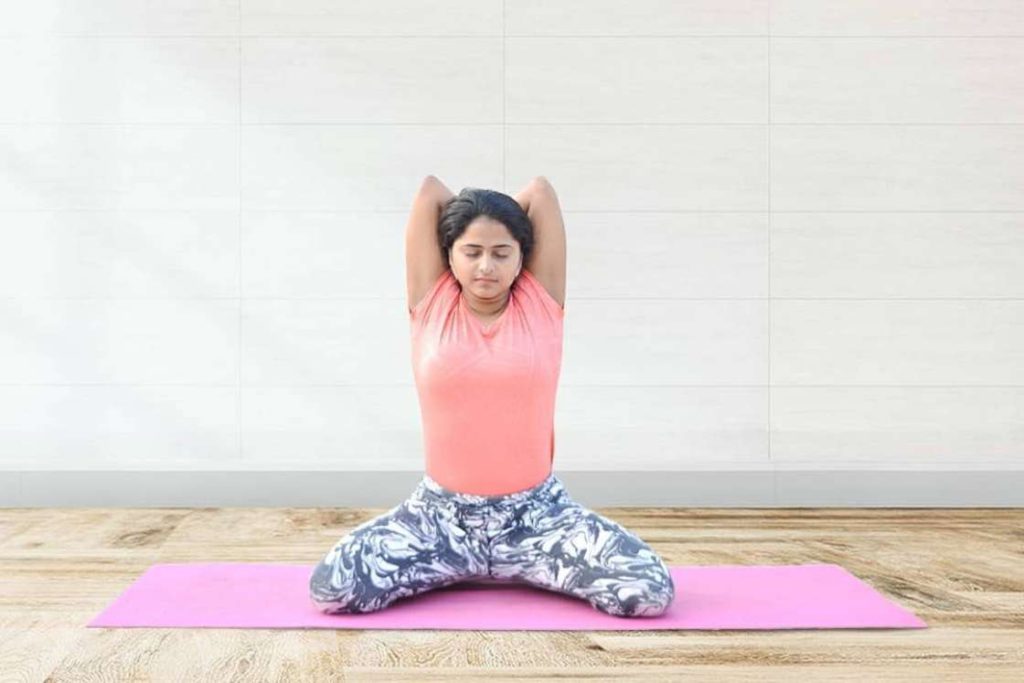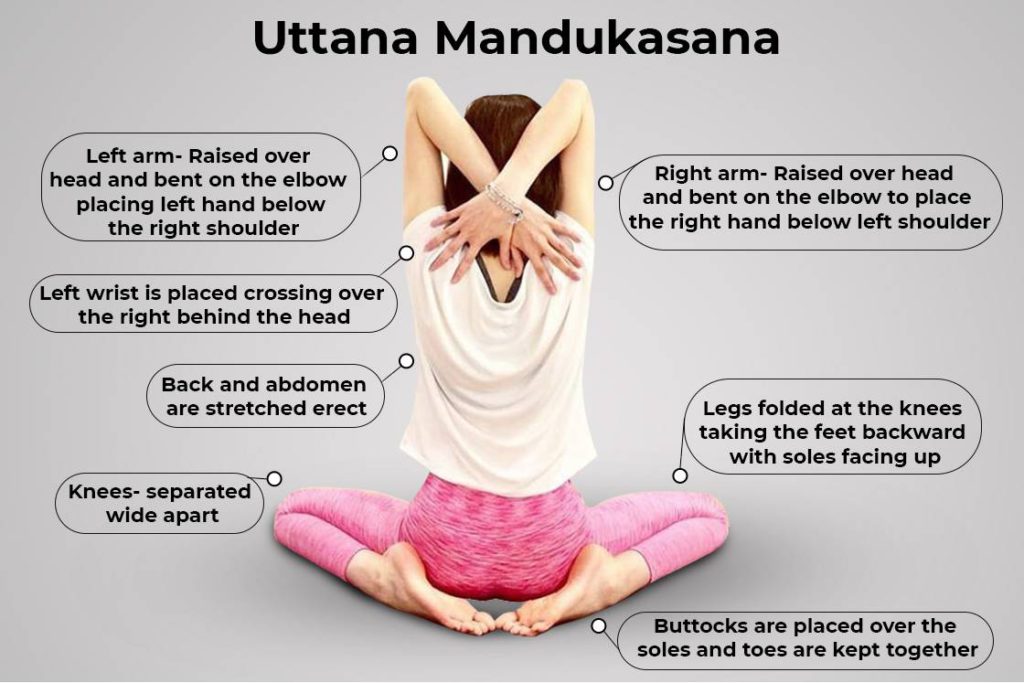
| Sanskrit Pronunciation | Uttana Mandukasana (Oot-AHN-ah Man-doo-KAHS-uh-nuh) |
| Meaning | Uttana = stretched up / Manduka = frog/ Asana = pose |
| Pose Type | Sitting, stretching |
| Pose Level | Intermediate |
| Anatomy | Lower back muscles, arms, shoulders, Knees, hips, hamstrings |
| Other Names | Stretched Up Frog Pose and Extended Frog Pose |
Uttana Mandukasana, or the Extended Frog Pose, is a variation of Mandukasana (Frog Pose) that emphasizes stretching and lengthening the spine. In Sanskrit, “Uttana” means “stretched up” or “upright,” “Manduka” translates to “frog,” and “asana” means “pose.”
This pose involves holding the body in a frog-like position, extending the spine, and opening the hips. The benefits of Uttana Mandukasana include increased flexibility in the hips and lower back, strengthened core muscles, relief from neck and shoulder pain, alleviation of cervical spondylosis symptoms, improved balance, and enhanced relaxation through deep breathing.
Mythology
Uttana Mandukasana is one of the thirty-two yoga postures described in the second chapter of the Gheranda Samhita. This text, written in the 17th century, explains that while in Mandukasana (Frog Pose), you should hold your head with your elbows. This position looks like an upright frog, which is why it is called Uttana Mandukasana.
According to the Gheranda Samhita, there are 8,400,000 yoga poses mentioned by the deity shiva. Out of these, 84 are considered important, and 32 are especially beneficial for people. The Gheranda Samhita is one of the three main texts of Hatha Yoga, a type of yoga similar to the one taught by Patañjali. It is attributed to the mythical figure Matsyendranātha and includes detailed descriptions of these key postures.
How to do uttana mandukasana (steps)

- Sit in Vajrasana with your toes joined and knees spread wide apart. Place your hands between your knees for support.
- Bring your chin to your chest to engage Jalandhara Bandha.
- Inhale, raise your right arm, and bend it at the elbow to place your hand below your left shoulder.
- Similarly, raise your left arm, bend it, and place your left palm below your right shoulder.
- Cross your left wrist over your right wrist behind your head.
- Hold the pose for 3-10 breaths, expanding your chest and arching your spine.
- To release, lift your left arm first, followed by your right arm, and lower them to your knees.
- Bring your knees closer together and return to the initial sitting position.
Note: These steps can also be performed in sequence with Mandukasana as described in Gheranda Samhita involving the 3 Bandhas (Mula, Uddhiyana, and Jalandhara).
Additional tips
- Breathe normally while holding the pose to maintain relaxation and stability.
- Keep your knees spread apart while ensuring your toes stay in contact, with your buttocks resting above the soles.
- Practice the pose 2-3 times, holding each position for about 30 seconds to build flexibility and strength.
Preparatory poses
Precautions
- Avoid practicing if you feel any discomfort in your shoulders, elbows, or knees.
- Modify the pose if you have existing injuries, especially in your back, shoulders, or hips.
- Do not force yourself into the pose; listen to your body and avoid overstretching.
- Ensure proper alignment and support to prevent strain or injury.
Contraindications
- Avoid this pose during pregnancy or menstruation.
- Do not practice if you have severe back pain or spinal deformities.
- Seek expert supervision if you have arthritis or a hernia before attempting the pose.
- Refrain from doing the pose if you have a disability in your hip joint.
- Avoid practicing if you experience pain in your shoulders, elbows, or knees.
Uttana mandukasana benefits
Uttana Mandukasana is a versatile yoga pose that enhances overall flexibility, strengthens core muscles, and promotes relaxation. This pose is particularly effective in relieving neck and shoulder pain, improving balance, and addressing symptoms of cervical spondylosis. By incorporating Uttana Mandukasana into your routine, you can achieve better flexibility, strength, and mental calmness.
- Stretches & Strengthens the Spine: Uttana Mandukasana stretches the back muscles, lengthening the spine and strengthening both upper and lower back muscles. This enhances spinal flexibility and makes the back muscles more supple.
- Strengthens Core Muscles: Uttana Mandukasana engages and stretches the abdominal muscles, enhancing their strength and endurance. By massaging the core and improving blood circulation in the abdominal region, this pose fortifies the core muscles, contributing to greater stability and support for the entire torso.
- Alleviates Cervical Spondylosis Symptoms: Uttana Mandukasana helps alleviate cervical spondylosis symptoms by improving flexibility and strength in the neck and upper back. This pose reduces stiffness and discomfort by stretching and relaxing tight muscles, enhancing overall mobility. Regular practice can lead to a reduction in pain and increased ease of movement in the affected areas.
- Tones the Arms: The pose involves intense stretching of the arm muscles, stimulating the shoulder blades, elbows, and wrists. This provides a gentle workout for the arms, resulting in toned and stronger muscles.
- Strengthens Leg Muscles: By folding the legs at the knees and widening them, the pose intensely stretches the quadriceps and improves blood circulation in the leg muscles. This strengthens the hip joints, knees, thighs, calves, and ankles.
- Promotes Lung Capacity: In the final position, the chest expands fully, stretching the lungs and diaphragm. This increases lung capacity, clears respiratory pathways, and facilitates better respiration.
- Improves Reproductive Health: The pose stretches the groins and pelvic floor muscles, enhancing blood flow to the genitals and supporting overall reproductive health.
- Opens the Sacral Chakra: Uttana Mandukasana stimulates the sacral chakra (Swadhisthana) by stretching the abdomen and genitals. This enhances creative skills, brings emotional stability, and increases overall pleasure
Conclusion
Uttana Mandukasana is a powerful pose that enhances flexibility, strength, and balance. By incorporating this asana into your practice, you can benefit from improved lower body flexibility and core strength. Remember to practice mindfully, listen to your body, and use props if necessary. With consistent practice, Uttana Mandukasana can become a valuable addition to your yoga routine, offering both physical and mental benefits.
FAQs Uttana Mandukasana
Begin by holding the pose for 20-30 seconds and gradually increase the time as you become more comfortable and flexible.
Yes, Uttana Mandukasana can help alleviate back pain by stretching and strengthening the back muscles, improving overall spinal flexibility.
While it may be challenging for beginners, using props for support and gradually working on flexibility can make it accessible. Always practice with proper guidance.
People with severe neck or back issues, recent injuries, or those who are pregnant should avoid this pose. It’s important to consult a healthcare provider before attempting it.
Common mistakes include not spreading the knees wide enough, collapsing the lower back, or not extending the arms fully. Maintain a straight back and proper alignment.
Focus on gradual deepening of the stretch, use props for support, and consistently practice to improve flexibility and comfort in the pose.




